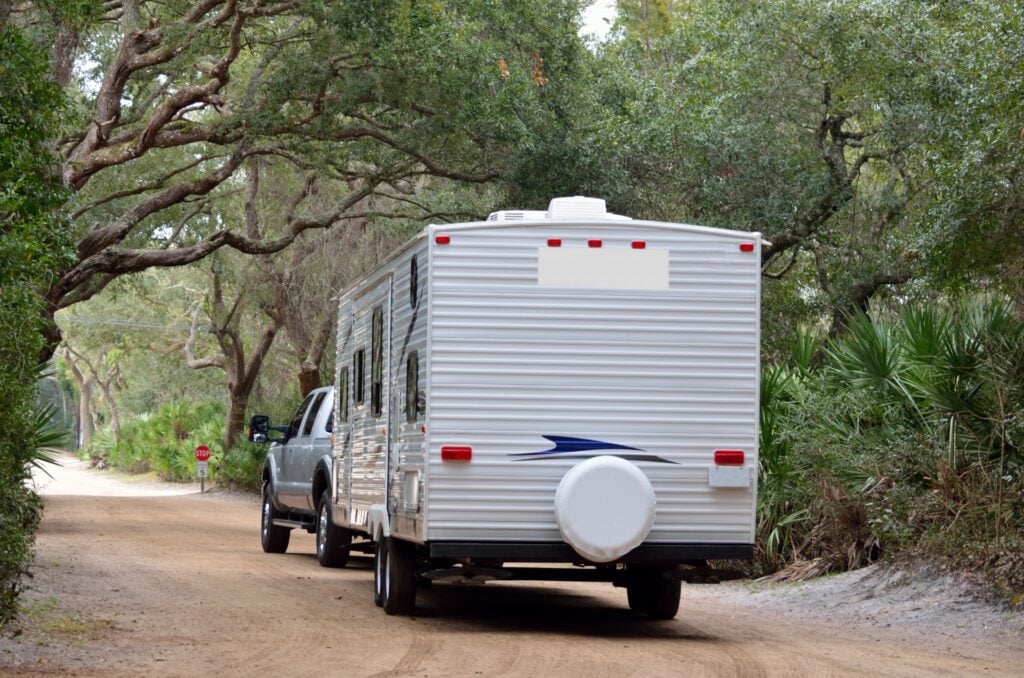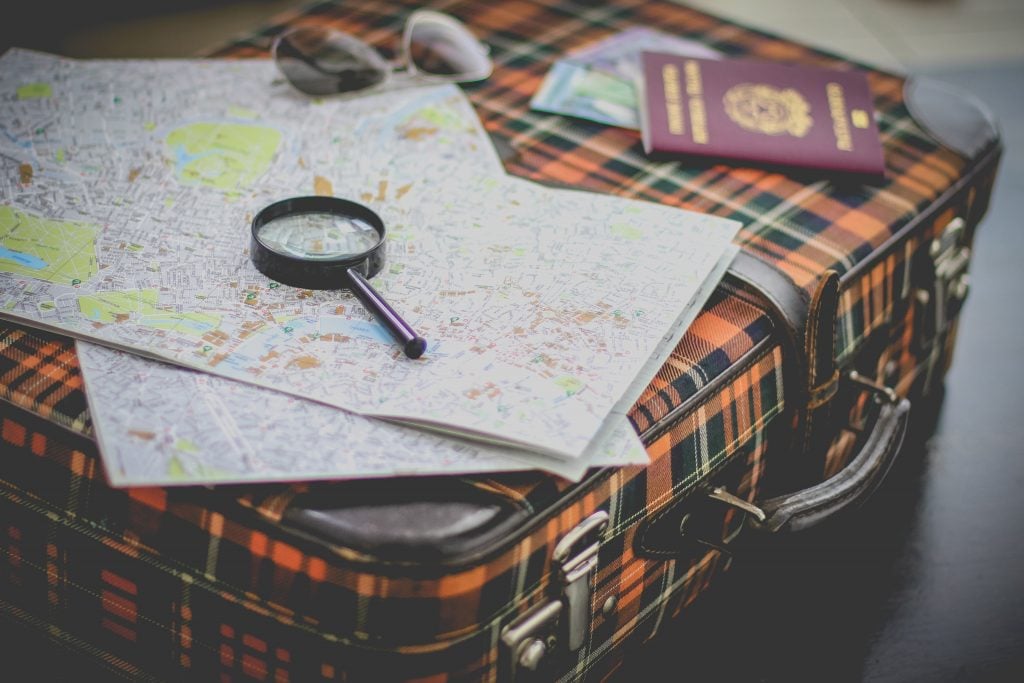
How To Avoid The Dangers Of An Overweight Trailer
Do you need to lose weight? No, I don’t mean go on a diet or start exercising more. I’m talking about trailer weight—you know, those extra pounds that stack up every time you buy a souvenir or invest in a new DVD player for your RV.
According to the RVSEF, about 60% of travel trailers exceed their maximum weight capacity. A couple of extra pounds may seem like a minor problem, but the truth is that excessive trailer weight is responsible for the majority of RV safety issues. Keep reading to find out how to avoid these hazards and make your next trip a safe one.
How to find out if you’re overweight
The first step is to find out if your trailer actually is overweight. Check the GVWR (Gross Vehicle Weight Rating) and GCWR (Gross Combined Weight Rating) in your tow car’s manual to determine the maximum weight your vehicle can handle, including itself and its passengers. Also note your trailer’s GVWR, which is often found in the user manual or printed inside the trailer. When you have these numbers, you need to take your vehicle and trailer to a weighing station.
The most accurate method of weight measurement is wheel position weighing, which determines how much weight is resting on each of the vehicle’s wheels. This allows you to see if the trailer’s weight is unevenly distributed. Only a few companies offer wheel position weighing, but many of them travel the country. If you’re willing to pay the $75 for an accurate measurement, you can make an appointment online.
A cheaper and more convenient way to get a semi-accurate weight measurement is by using a certified CAT scale, found at many truck stops. These cost about $10 the first time you measure, and only a couple dollars each time afterward. CAT scales take an axle-by-axle reading, which still gives you a good idea of your trailer’s weight. Just make sure it falls far below your trailer’s GVWR.
You can also use a CAT scale to weigh your tow vehicle and make sure that the weight of your car doesn’t exceed its limits. After weighing your vehicle and tow trailer, you can add the two weights together and compare it to your car’s GCWR. This will tell you if your vehicle is able to tow your trailer.

Check the GVWR in your tow car’s manual to determine the maximum weight your vehicle can handle
Dangers of traveling with an overweight trailer
If your trailer’s weight (including all cargo and passengers) does exceed its maximum capacity, driving with the trailer attached is a huge risk. Overweight trailers put more pressure on the wheels and axles than they are designed to handle, which can cause tire blowouts or trailer sway.
Excess weight causes tires to wear more quickly and makes it harder to stop the vehicle. If your vehicle is involved in an accident, you will be liable. Insurance companies will be less likely to help pay for damages. Police officers can also pull you over and give you a hefty fine if they suspect that your trailer is overweight. In other words, traveling with extra weight just isn’t worth the issues that it can cause.
How to lose trailer weight
“So,” you may be asking, “now what?” The answer is simple—it’s time to lose some weight. Obviously, you can’t throw out large items like your mattress or toilet, but you might be surprised at how much you can downsize by paying attention to the small things in your trailer.
Every time you buy a souvenir, a decoration, or even a storage basket, you add weight to your trailer. These tiny amounts really add up, so consider getting rid of some of the extra stuff. Ask yourself which items you need to keep, and which ones you hardly ever use. This could be clothing, extra bedding, unnecessary dishes, or the camp stove you never cook with. Be frugal with what you decide to buy and keep the weight of your trailer in mind.

Donate extra clothing that you never wear. Photo by Francesca Tirico/Unsplash
Top tips for trailer weight
- Fill it up: Keep in mind that water, propane, and fuel add extra weight. Fill all your tanks before weighing for an accurate measurement.
- Weigh in advance: Don’t wait until the day you start a long trip to weigh your trailer. Give yourself time to make adjustments and make an appointment at a weighing station if you need to.
- Balance your weight: Even if your trailer falls within the weight limits, too much weight on one side can cause a serious accident. Rearrange your things to evenly distribute their weight.
- Leave room to grow: Don’t go traveling with a trailer that falls just a pound or two under the weight limit. Leave as much room as possible in case you absolutely have to add something.
- Weigh your stuff: When packing your trailer, consider stacking food, clothes, and anything else that you’re bringing in a cardboard box and weighing it on a bathroom scale. This can give you an idea of how many pounds you’re adding.
Overweight trailers may seem like a small problem, but surpassing your vehicle’s maximum capacity can be disastrous. Pay attention to your trailer’s weight and stay safe on the road. For more info, check out our article, Haul Less Weight In Your RV With These Useful Tips.

There is a seriously flawed article.
Nowhere does it talk about the TRAILER Gross Vehicle Weight rating (GVWR). Certainly the tow vehicle’s GVWR is seriously important, but so is the trailer’s. Weighing the trailer will give the weight of the trailer, compare that to the TRAILERS GVWR, check the tow vehicles weight to insure it’s not over the tow vehicles GVWR, and finally, add the two to find out if the tow vehicles Gross Combined Weight Rating, which should be in your owner’s manual or contact the manufacturer or a dealer, is being exceeded. All are important!
They did mention the trailer GVWR. However, they failed to mention the GAWR’s on the tow vehicle. It is possible to be within all other ratings and still overloaded on the rear axle.
The very first paragraph mentions Trailer Gross Vehicle Weight Rating.
The escapees RV club has a program called “smartweigh”, where they weigh each individual tire (by axle) of the tow vehicle (TV) and towable and then just the TV. They also do motor homes. There’s 3 sites and I used the one near the Houston Tx area. We have a 2015 Chevy 2500HD duramax pulling a 35’ 5th wheel with a trailer GVWR of 10995 lbs. The truck owners manual says my truck can pull a 5th wheel up to 17,100lbs. There should be no problem with ours. When it was weighed, with just me in the truck, none of the truck or trailer axles or individual tires were near max weights and the trailer weighed in at 9750lbs. The truck and RV combined was 17850lbs, below combined limit. However, the truck alone with me in the drivers seat, disconnected from the camper weighed 8350lbs. Pin weight was 1400lbs. Added together, the truck weight was 9750lbs, only 250lbs below the truck GVWR of 10000lbs. 250lbs more of pin weight or more people or stuff in the truck would max out the truck GVWR. So, it’s easier than you think to be overloaded. FWIW, I had a couple of coolers with ice and food, boards for leveling, and clothes in the truck. Fuel tank was nearly full. Trailer tanks were each less than 1/2 full.
1400 pin wt is extremely light. Recommended is 15 to 25 percent of trailer weight (5th wheel) and you come in at 12.7 percent. Your payload is 1650 lbs. At the ave of 20 percent of trailer weight that would give you a max trailer weight of around 8-9000 lbs.
At actual weight that would be 14.3 per cent – still on the light side, since the experts recommend the 25 percent weight versus the 15 percent.
All Tires and wheels should be EQUAL, in terms of Tire Load Capacity and Wheel (RIM) capacity.
The same should apply on your TOW vehicle. When you change tires, you should replace them all at the same time. Yes, it is a costly situation, but that is part of owning an RV.
You should never exceed the GROSS VEHICLE WEIGHT OF THE TRAILER. and it is on a Placard on the RV someplace.
People forget that personal belongings weight ADD up fast. Especially clothing! People take too many clothes along on RV Trips. Even those people who FULL Time, usually have too much weight in their RV’s
Water is your worst Enemy! You should NEVER Travel down the road with a full tank of water! I travel with about 1/4 tank, just enough for flush water, should I have to stop for bathroom breaks. I have 110 gallon water tank and full that would add up to 830 pounds. That would be all dead weight! So, it is wise to travel with as little water as possible.
You SHOULD also have a Tire Pressure Monitoring System (TPMS) If you don’t want to purchase for all your tires, at least purchase for the RV or Trailer Tires. Best Money you will ever spend!
FAR TOO MANY PEOPLE DO NOT ADHERE TO SAFETY or Safe operation of an RV!
And what did we do before TPMS were available? Check our tire pressure and condition religiously. And change out sets of tires at least every 4 yers regardless of mileage.
If you want to give me a TPMS I’ll use it.
This “CAT scale, found at many truck stops. These cost about $10 the first time you measure, and only a couple dollars each time afterward. ” is HIGHLY INACCURATE!
When you pull on a CAT scale, you’re asked “FIRST WEIGH OR REWEIGH”, you answer, then “TRUCK NUMBER”, “TRAILER NUMBER” and “COMPANY NAME”
Per catscale dot com
“What is CAT Scale’s reweigh policy?”
A reweigh for $2.00 may be charged, after the first weigh, if all of the following are true:
Same vehicle (tractor and trailer),
Full price ticket is presented by the customer and its number is recorded on the reweigh ticket,
Reweigh must be from the same scale as the full priced ticket,
Reweigh must be within 24 hours of the full priced ticket.
“I am really having a problem getting legal. Is there a limit on how many reweighs I can get for $2.00?”
We know there are times when it is difficult to get a load legal, after paying for a full price weigh ($11.50) and two reweighs (for a charge of $15.50), the on duty manager may elect to void all further reweighs until you are legal. The reweigh that shows you legal will be the last one you will have to pay for. The total charge in this case would be $17.50.
So no, you don’t get all your other weighs cheaper. But they ARE accurate, and do stand behind you should you get an overweight ticket after being shown legal on one of their scales. I suggest you go to catscale dot com and read their FAQ’s
Where is the link to these places that the article states that they will come out and weight individual axles or wheels?
For me it’s a one hour drive to the nearest scale at a feed store.
The first thing that usually goes over is the truck payload. The single most important thing is to buy the best highest weight rated tires and keep them properly inflated. Keep the speed down and following distance. Sometimes hauling the water tank full is a good thing since that is bottom weight that helps with high winds and sway. If you camp where I go you need water because I don’t go to parks.
Tire load rating is also very important and not mentioned. Make sure you buy the strongest tire available in your wheel size.
I have a problem with this: “If your vehicle is involved in an accident, you will be liable. Insurance companies will be less likely to help pay for damages. Police officers can also pull you over and give you a hefty fine if they suspect that your trailer is overweight”
it all depends on HOW much overweight – and if that caused/contributed to an accident. Also, you will not get a fine if an officer “suspects” you’re overweight unless you’re weighed.
Not just inaccurate, but inflammatory.
Ella, thank you for all of the information you provided about overweight trucks and trailers. I like how you mentioned that if a police officer suspects your vehicle is overweight, they will pull you over and give you a hefty fine. I think that it could be beneficial to get an overweight permit for your vehicle if you think it might be overweight to avoid getting a ticket.